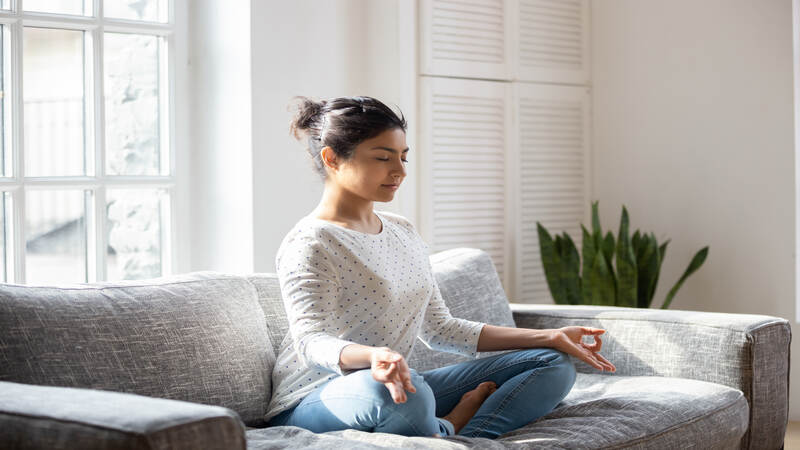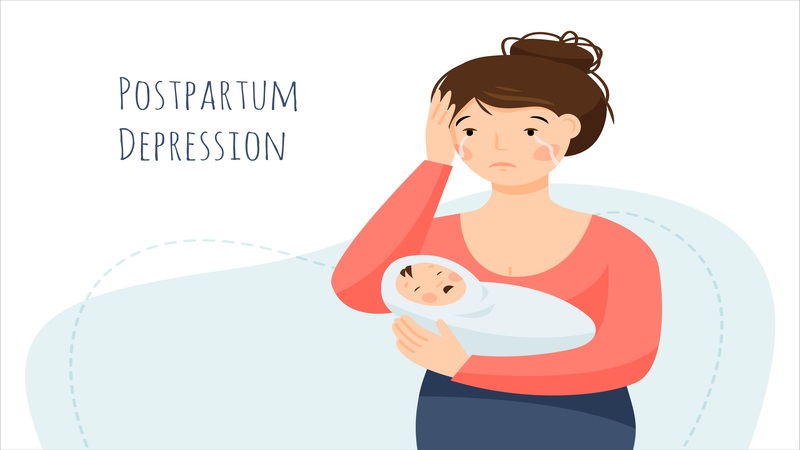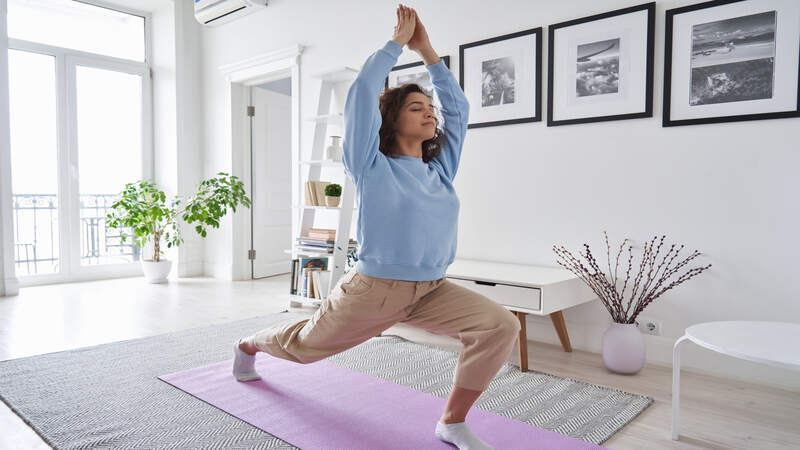
If you’re experiencing depression, anxiety, and stress after pregnancy, you’re not alone. Postpartum depression (PPD) or depression after childbirth is common among women. New mothers can feel sad, tired, or depressed for weeks or even months after delivery. This can be tough for you as a mother, and you may lose focus on caring for yourself and your baby. But the good news is—you may try various alternative therapies for postpartum depression to keep these nasty feelings at bay while bringing joy.
Here, you’ll check out the best therapies that can help you manage depression after delivery so you can ensure your and your baby’s health and embrace every moment.
What is Postpartum Depression?

Just like usual depression, postpartum depression happens after childbirth. According to the CDC (Center for Disease Control and Prevention), 1 in 8 women experiences postpartum depression after delivery (1). It can make you feel tense, sad, tired or empty. You can experience mood swings and hopelessness as if you’re not interested in anything.
When it comes to its cause, it can occur due to rapid changes in the reproductive hormone levels, such as estradiol and progesterone (2). This leads to disturbance in the chemical activity in the brain, leading to mood swings and depression. Plus, when you’re overwhelmed or sleep-deprived, this may trigger depression. Addedly, factors such as family history of mood disorders, couple disputes, low social support, etc., may impose a high risk of postpartum depression.
[Read : Baby Blues]
Alternative Therapies For Postpartum Depression
It’s common to experience postpartum depression or “baby blues” after pregnancy. However, you can tackle this by involving in complementary or alternative therapies. This can ensure your mental and physical well-being effectively. Some alternative therapies include;
1. Meditation and Mindfulness
Meditation has been practiced since ancient times. It is one of the easiest ways to ensure mental fitness. From improving your attention to managing your mood swings, meditation can help with everything. When it comes to postpartum depression, meditation can help combat stress and anxiety (3). Additionally, it controls related symptoms like fatigue, sleep disturbances, and sadness so you can feel better.
2. Yoga and Exercise

Yoga and exercise are just other alternative therapies meant to boost mental, physical, emotional, and spiritual well-being. They can be helpful both before and after pregnancy. According to research, yoga is one of the most effective treatments for depression and anxiety (4). Yoga and exercise are beneficial in combating multiple postpartum depression symptoms, including uncontrollable crying, mood swings, insomnia, anger, etc.
[Read : Postnatal Yoga — Yoga after Delivery for new Mothers]
3. Acupuncture
Acupuncture is an ancient Chinese technique that helps redirect energy through the body. Many practitioners believe that acupuncture restores health by releasing blocked energy. Your acupuncture therapist uses needles on your skin to simulate specific acupuncture points. This ensures better energy flow to tackle various symptoms, including stress and depression (5). Practitioners target acupuncture points for depression to improve your mental health while combating postpartum depression symptoms.
4. Massage Sessions
Massage could help manage depression symptoms by lowering your stress hormones, relaxing muscles, and enhancing sleep quality (6). A good massage enables you to recover from depression by stimulating brain functionality and increasing the level of mood-boosting hormones such as serotonin and dopamine.
5. Aromatherapy

Aromatherapy with essential oils can be one of the easiest ways for depression management. You can choose any essential oil as per your preference for your aromatherapy sessions to relieve stress.
6. Supplements
Natural and herbal supplements may work well to enhance your overall well-being. You may try including various home remedies or eatables in your diet. For instance, walnuts, flaxseeds, and fish are rich in omega-3 fatty acids that may improve or prevent depression. Addedly, it’s better to consult your doctor before incorporating such supplements into your diet.
7. Support Groups
Involving in self-help groups is a great way to indulge and surround yourself with good vibes. Being a part of a social group is fun. You can connect with like-minded people and share your feelings. This can enhance your mental and emotional state to evade stress. Furthermore, you can participate in recreational activities with your friends for a great session.
Alternative therapies for postpartum depression are a sure-fire solution to deal with depression and related symptoms. These ensure improvement right from your comfort zone. You can couple your preferred alternative therapies with your medications for better results. Also, don’t forget to consult your healthcare provider to ensure a smooth experience.
FAQ’s
1. How to Deal With Postpartum Depression?
Alternative therapies such as meditation, yoga, etc., along with your medication, can help you deal with postpartum depression. Moreover, it’s a good thought to upgrade your lifestyle for healthy well-being.
2. How to Cure PPD Naturally?
Most women experience postpartum depression (PPD) after delivery, and that’s a common issue. However, you can consider trying alternative therapies, such as meditation, exercise, acupuncture, etc., to cure PPD naturally.
References
- National Center for Chronic Disease Prevention and Health Promotion (NCCDPHP); Division of Reproductive Health – https://www.cdc.gov/reproductive-health/depression/index.html
- Karen Carlson; Saba Mughal; Yusra Azhar; Waqar Siddiqui; University of Nebraska Medical Center, Dow, University of Health Sciences, UMKC – https://www.ncbi.nlm.nih.gov/books/NBK519070/
- Li Y, Chen J, Chen B, Wang T, Wu Z, Huang X, Li S. Effect of mindfulness meditation on depression during pregnancy: A meta-analysis – https://www.ncbi.nlm.nih.gov/pmc/articles/PMC9515986/
- Bridges L, Sharma M. The Efficacy of Yoga as a Form of Treatment for Depression. J Evid Based Complementary Altern Med. 2017 Oct;22(4):1017-1028- https://www.ncbi.nlm.nih.gov/pmc/articles/PMC5871291/
- Manber R, Schnyer RN, Lyell D, Chambers AS, Caughey AB, Druzin M, Carlyle E, Celio C, Gress JL, Huang MI, Kalista T, Martin-Okada R, Allen JJB. Acupuncture for depression during pregnancy: a randomized controlled trial. Obstet Gynecol. 2010 Mar;115(3):511-520 – https://pubmed.ncbi.nlm.nih.gov/20177281/
- Dehkordi, Ziba Raisi; Hosseini-Baharanchi, Fatemeh Sadat1,2,; Kazemian, Afsaneh; Madiseh, Mohammad Rahimi3; Reisi, Marziye; Motaghi, Bahare. The Effects of Infant Massage on Maternal Postpartum Depression: A Randomized Controlled Trial. Nursing and Midwifery Studies 8(1):p 28-33, Jan–Mar 2019 – https://journals.lww.com/nams/fulltext/2019/08010/the_effects_of_infant_massage_on_maternal.5.aspx
Read Also: 12 Fun Exercises To Do With Your Baby
